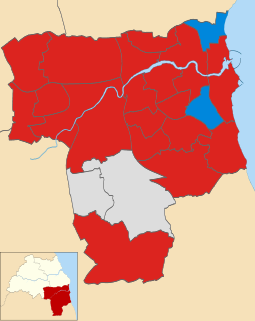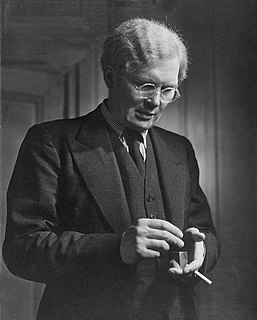
The 1945 United Kingdom general election was held on 5 July 1945, with polls in some constituencies delayed until 12 July and in Nelson and Colne until 19 July, because of local wakes weeks. The results were counted and declared on 26 July, to allow time to transport the votes of those serving overseas.

The 1964 United Kingdom general election was held on 15 October 1964, five years after the previous election, and thirteen years after the Conservative Party, first led by Winston Churchill, had entered power. It resulted in the Conservatives, now led by its fourth leader, Sir Alec Douglas-Home, narrowly losing the election to the Labour Party, led by Harold Wilson, with Labour having an overall majority of four seats. It resulted in Labour ending its thirteen years in opposition and led to Wilson to become, at the time, the youngest Prime Minister in more than 150 years.

The 1950 United Kingdom general election was the first ever general election to be held after a full term of Labour government. The election was held on Thursday 23 February 1950. Despite polling over 700,000 votes more than the Conservatives, and receiving more votes than they had during the 1945 general election, Labour obtained a slim majority of just five seats—a stark contrast to 1945, when they had achieved a comfortable 146-seat majority. There was a national swing towards the Conservatives, whose performance in terms of popular vote was dramatically better than in 1945. Labour called another general election in 1951.

Harrow West is a constituency created in 1945 represented in the House of Commons of the UK Parliament and which has returned the Labour Co-operative MP Gareth Thomas in the five General Elections from 1997 having previously returned Conservative MPs.

Elections for local government were held in the England and Northern Ireland on 5 May 2005 along with the 2005 general election across the entire United Kingdom. In addition, the Isle of Wight held a local referendum on the issue of a directly elected mayor.

Local elections took place in some parts of the UK on 7 June 2001. Elections took place for all of the English shire counties, some English unitary authorities and all of the Northern Ireland districts. The elections were delayed from the usual date of the first Thursday in May due to the 2001 UK foot and mouth crisis and were held on the same day as the general election.
The Monmouth by-election, 1991 was a by-election held for the British House of Commons constituency of Monmouth in Wales on 16 May 1991. It was won by the Labour Party candidate Huw Edwards.
The Tottenham North by-election, 1945 was a by-election held for the British House of Commons constituency of Tottenham North in London on 13 December 1945.
The Liverpool Wavertree by-election, 1935 was a by-election held in England for the House of Commons constituency of Liverpool Wavertree on 6 February 1935. It was won by the Labour Party candidate Joseph Cleary.
A parliamentary by-election was held on 30 March 1939 for the British House of Commons constituency of Kincardine and West Aberdeenshire.

The 2012 Sunderland Council election took place on 3 May 2012 to elect members of Sunderland City Council in England. It was held on the same day as other United Kingdom local elections, 2012.
The Wigan by-election of 4 March 1948 was held after the death of the incumbent Labour MP, William Foster.
A landslide victory is an electoral victory in a political system, when one candidate or party receives an overwhelming supermajority of the votes or seats in the elected body, thus utterly eliminating the opponents. The winning party has reached more voters than usual, and a landslide victory is often seen in hindsight as a turning point in people's views on political matters.
The West Derbyshire by-election of 1944 was held on 17 February 1944. The byelection was held due to the resignation of the incumbent Conservative MP, Henry Hunloke. Hunloke was the brother-in-law of Edward Cavendish, 10th Duke of Devonshire, who had held the seat from 1923 until 1938, when he succeeded to his title and was replaced by Hunloke. The seat had been held previously by Hunloke's father-in-law, and by the 9th Duke's brother-in-law, the future 6th Marquess of Lansdowne (1908-1918).
The Stalybridge and Hyde by-election of 1937 was held on 28 April 1937. The by-election was held due to the resignation of the incumbent Conservative MP, Philip Dunne. It was won by the Conservative candidate Horace Trevor-Cox.

The 2014 Calderdale Metropolitan Borough Council election took place on 22 May 2014 to elect members of Calderdale Metropolitan Borough Council in England. This was on the same day as local elections across the United Kingdom and a European election. One councillor was elected in each of the 17 wards for a four-year term. There are three councillors representing each ward elected on a staggered basis so one third of the councillor seats were up for re-election. The seats had previously been contested in 2010 which was held in conjunction with a general election. The turnout was significantly lower in 2014 than in 2010 which is not unusual when comparing local elections that coincide with general elections to ones that do not. Prior to the election Labour was the largest party in the council with 21 out of 51 seats, 5 seats short of an overall majority. After the election there was no overall control of the council. Labour had 25 seats, only one short of a majority and so Labour continued to operate a minority administration.

The 2016 Calderdale Metropolitan Borough Council election took place on 5 May 2016 to elect members of Calderdale Metropolitan Borough Council in England. This was on the same day as other local elections. One councillor was elected in each ward for a four-year term so the councillors elected in 2016 last stood for election in 2012. Each ward is represented by three councillors, the election of which is staggered, so only one third of the councillors was elected in this election. Before the election there was no overall control with a minority Labour administration. After the election there was still no overall control so the minority Labour administration continued.

The 2018 Calderdale Metropolitan Borough Council election took place on 3 May 2018 to elect members of Calderdale Metropolitan Borough Council in England. This was on the same day as other local elections. One councillor was elected in each ward for a four-year term so the councillors elected in 2018 last stood for election in 2014. Each ward is represented by three councillors, the election of which is staggered, so only one third of the councillors were elected in this election. Before the election there was no overall control with a minority Labour administration. Following the election Labour, having gained one councillor, was still two councillors away from a majority so it remained no overall control.

The 2018 City of Bradford Metropolitan District Council took place on 3 May 2018 to elect members of Bradford District Council in England. This was on the same day as other local elections. One councillor was elected in each ward for a four-year term so the councillors elected in 2018 last stood for election in 2014. Each ward is represented by three councillors, the election of which is staggered, so only one third of the councillors were elected in this election. Before the election there was a Labour majority and afterwards Labour had increased their majority.

The 2018 Sunderland City Council election took place on 3 May 2018 to elect members of Sunderland City Council in England. The election took place on the same day as other local elections.












